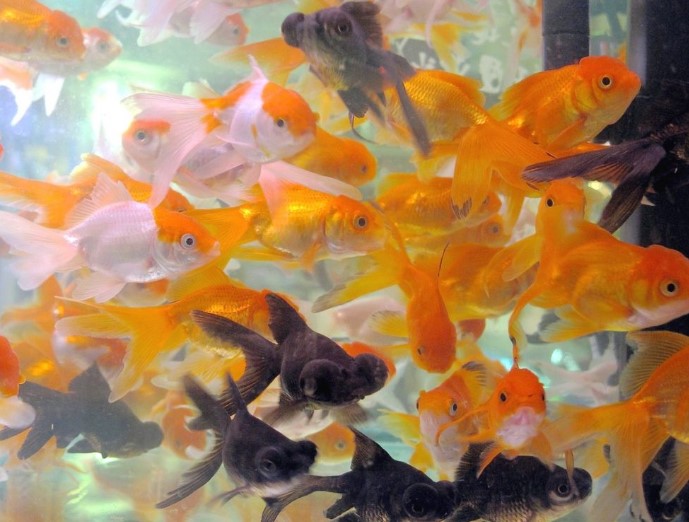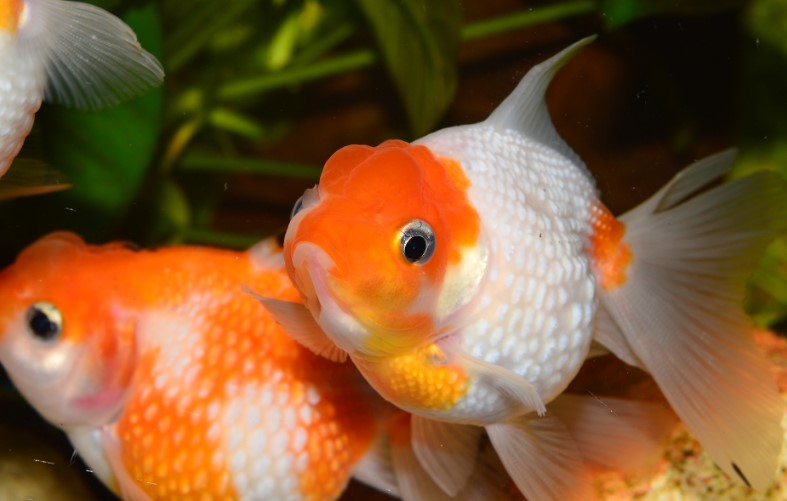How long can goldfish go without food? Goldfish have difficulty digesting large amounts of protein. Their diets should contain a higher concentration of carbohydrates than protein. Goldfish food comes in two forms – flakes that float on top of the water and pellets that sink to the bottom. Choose between pellets and flakes based on your goldfish’s feeding habits. You can also use food that is formulated for different levels of the tank.
Goldfish could live without food for eight or fourteen days. Goldfish usually scavenge their aquarium and eat algae. In ponds, depending on the size and available algae (sometimes goldfish also eat plants, check out this list here ) and insects, goldfish could go without feeding indefinitely. The interesting fact is that until recent studies, it was commonly believed that goldfish kept in a pond could survive thirty days without any food at all.

Slow-release fish food is not an option for goldfish
Goldfish are hardy creatures that can go for up to two weeks without any food. In rare cases, they can go for even longer. However, you shouldn’t leave them unfed for more than a week at a time. It is important to plan your trip so that you can feed them regularly. Otherwise, your Goldfish might not survive and you might end up spending days without goldfish food.
Slow-release fish food is a good option if you’re going out of town or are away for a business trip. However, if you don’t have a reliable source of food, you can always withhold the food for 2 days and check on the water quality yourself. While this is a temporary solution, this method can be ineffective for long-term problems and should only be used as a last resort. If your fish are not eating, the problem must be solved by changing the water quality or taking steps to solve it.
Aggressive goldfish types have a better chance of survival in the wild
How long can aggressive goldfish types survive without eating in the wild? Goldfish in the wild do not eat every day, so they can survive for up to two days without food. During their time in the wild, they feed mostly on aquatic plants and fish eggs. To keep your goldfish healthy, you should feed them a balanced diet that contains a high proportion of carbohydrates. Fresh vegetables and fruits, as well as freeze-dried and ready-made fish food, are good choices.
When in the wild, goldfish are more aggressive than those in a tank. When they are not fed, they may die of starvation and become black and white. If you are not sure whether a goldfish will survive without food, you can take a look at its survival statistics. There have been some cases where goldfish have gone up to 134 days without food in the wild. In the same way, the amount of food your goldfish consumes affects the duration of time it can survive without food.
Overfeeding goldfish can pollute the water
When you overfeed your goldfish, you are compromising the quality of the water. You may notice cloudy water in a few days. This is the result of organic material decaying in the tank. Uneaten food will fall to the bottom of the tank and rot. The uneaten food will add to the amount of waste in the water and weaken the immune system of the fish. The problem is worse if you overfeed frequently.
You’ve probably heard that overfeeding can kill goldfish. However, goldfish don’t know when to stop eating and will go hungry for days at a time. In nature, goldfish can go for days without food, and have developed a mechanism to eat rapidly. If you are overfeeding your goldfish, you’ll find the water cloudy and milky. The water in your tank will become milky and contaminated.

Feeding goldfish when you’re away
If you are going on vacation, you need to consider feeding goldfish while you’re away. You can feed your goldfish manually or set up an automatic feeder that dispenses food for a specified amount of time. However, it is important to remember that the fish in your tank are resilient and may become shocked if you make a sudden movement while they are eating. Unless you have a sitter who is an expert in caring for goldfish, feeding goldfish while you’re away is a risky proposition.
Goldfish can eat a large portion of food within a minute. However, be careful to avoid giving them bread or vegetables as these can cause stomach upsets. Instead, try feeding them as much food as they can eat in fifteen to thirty minutes. The goal of feeding is to provide enough protein for both the fish and the eggs that will hatch. It is best to feed your goldfish at least twice a day, or more, depending on the number of goldfish in your home.
If you are concerned about your goldfish and it not eating for more than a couple days, there are a few places to look for guidance. Keep an eye out for other fish in the tank for more information on the health of the tank itself. Check the ammonia, nitrites, and GH levels of your water to see if there is a short term problem with the tank itself that could cause harm to your fish. If all is good with the tank and your fish is still refusing food after three days of fasting, you might also try offering a small bit of lettuce or another piece of vegetable/ fruit if you can find one that will fit in their mouth to test them on whether they will eat during this off-time.

